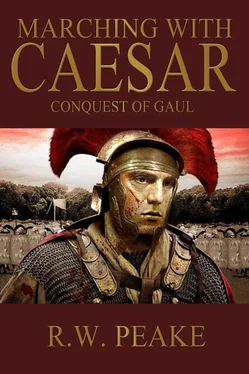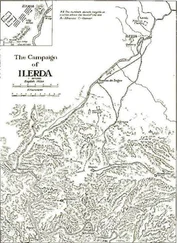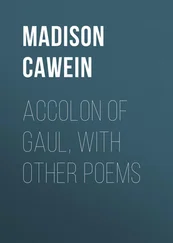R. Peake - Marching With Caesar - Conquest of Gaul
Здесь есть возможность читать онлайн «R. Peake - Marching With Caesar - Conquest of Gaul» весь текст электронной книги совершенно бесплатно (целиком полную версию без сокращений). В некоторых случаях можно слушать аудио, скачать через торрент в формате fb2 и присутствует краткое содержание. Жанр: Исторические приключения, на английском языке. Описание произведения, (предисловие) а так же отзывы посетителей доступны на портале библиотеки ЛибКат.
- Название:Marching With Caesar: Conquest of Gaul
- Автор:
- Жанр:
- Год:неизвестен
- ISBN:нет данных
- Рейтинг книги:3 / 5. Голосов: 1
-
Избранное:Добавить в избранное
- Отзывы:
-
Ваша оценка:
- 60
- 1
- 2
- 3
- 4
- 5
Marching With Caesar: Conquest of Gaul: краткое содержание, описание и аннотация
Предлагаем к чтению аннотацию, описание, краткое содержание или предисловие (зависит от того, что написал сам автор книги «Marching With Caesar: Conquest of Gaul»). Если вы не нашли необходимую информацию о книге — напишите в комментариях, мы постараемся отыскать её.
Marching With Caesar: Conquest of Gaul — читать онлайн бесплатно полную книгу (весь текст) целиком
Ниже представлен текст книги, разбитый по страницам. Система сохранения места последней прочитанной страницы, позволяет с удобством читать онлайн бесплатно книгу «Marching With Caesar: Conquest of Gaul», без необходимости каждый раз заново искать на чём Вы остановились. Поставьте закладку, и сможете в любой момент перейти на страницу, на которой закончили чтение.
Интервал:
Закладка:
Despite their desperate situation, the remaining Centurions ordered a fighting withdrawal back to the camp, which they performed, battling every step of the way. I can only imagine the agony of those two miles, yet somehow, a small number of men, perhaps 300 in all, made it back to the walls of the camp. The aquilifer of the 14th Legion, a man named Lucius Petrosidius was trapped against the wall of the camp, unable to break free of the press of the Eburones, who knew how highly we value the symbol of our Legion and were as equally determined to take it as he was to keep it. Even with him putting up a ferocious fight, he clearly saw that he was doomed, so rather than let the eagle fall into the hands of the enemy, he threw it over the wall before being cut down. The remainder of the men managed to make it into the camp, yet despite the temporary respite, they knew that their overall situation was hopeless. That night, rather than fall into enemy hands, they made a pact, killing themselves to a man. Some men, perhaps 50 all told, made a break for the woods beyond the camp rather than entering it, at least that was their story when they finally made their way to our camp some 50 miles away. I do not doubt that many of these men were truthful, that they fought their way out of the ambush back to the camp, whereupon they decided to throw the dice, betting on the uncertain safety of the forest, but which also provided the only chance of living past the next few watches. Their wounds, the condition of their clothing and most importantly, the look in their eyes told us that they were speaking the truth. There were others, however, whose condition was suspiciously good for what they had supposedly been through, and these men were treated with suspicion and hostility. Every Legion, no matter how stalwart, has its share of men who are the first to break and run when things get dangerous, even though it is a risky thing to do, since the punishment for such behavior is death by beating from your comrades. But in our army, where even the newer Legions had served for a couple of years, the most obviously cowardly of the lot had long since disappeared, one way or another. Those men left who were of a similar mind were much more cunning, having learned how to disguise their flight as something other than cowardice. Even in my own tent section, we had a man who was of such a nature, but as much as I hate to be fair to Didius, he was not a complete coward. Whatever the cause, these men who escaped brought us tidings of the greatest disaster to befall our army, and Caesar, since we were in Gaul.
This disaster was just the beginning of the troubles. Ambiorix, flushed with success, headed into the territory of the Aduatuci, persuading them to join his cause. Following that, he moved into the lands of the Nervii, our old enemies, who we had been told were slaughtered at the river that day. Despite the fact that they were greatly diminished in numbers, they were not the 500 warriors that the old men claimed; it was during this time we learned definitively that more than 7,000 had escaped into the woods. They needed little prodding to throw their lot in with Ambiorix and the Eburones, and it was to the younger Cicero’s camp that they headed next. Ambiorix had set out almost immediately after the bodies of the remaining men in the camp of the 14th that slew themselves were discovered, with he and a group of horsemen riding hard to reach first the Aduatuci, then the Nervii. Because of the speed of his advance, word of the disaster had not yet reached Cicero’s camp; piecing things together later, we calculated that the first of the survivors of the massacre were just arriving at our camp when the combined host of Gauls swooped down onto Cicero and the 7th. They first surprised a group of men out on woodcutting detail, slaughtering a full Century to a man, before surrounding the camp and beginning the assault. It was only the courage and steadfastness of the men of the 7th that kept the enemy at bay that first day, and from all accounts, it was a close-run, desperate thing, yet when night fell our boys still held the camp. Cicero possessed the presence of mind to send not just one but several messengers to Caesar telling him of his predicament, although he and his men held little hope that they would be able to hold out long enough for relief, even if any of the messengers got through to Caesar. During that first night, all the men of the 7th, even those on the sick list because of a bloody flux that was sweeping through the camp, along with men wounded in that first day, pitched in to strengthen their defenses and repair the damage to the camp suffered during the first assault.
Such was the nature of the siege of Cicero’s camp; during the day the Gauls would do everything in their power to create a breach in the wall but never succeed, with the men of the 7th spending the night patching up holes and repairing damage. Cicero knew that every day he held out was one day closer to Caesar coming to the relief. Regardless, he continued to send messages out with volunteers, giving Caesar an almost watch by watch account of what was taking place. Fortunately, Cicero had another ally, although he probably was not aware of it at the time, and that was the impatient nature of the Gauls themselves. Ambiorix's men were becoming bored, and he knew that time was no longer on his side because he faced either the appearance of Caesar, who by this time would undoubtedly have learned of the fate of the men of the 13th and 14th, or the disappearance of his own army as winter began to settle in. It was this that spurred him to ask for a parley with Cicero, determined to use the same ruse that had worked with Sabinus. Cicero, despite being something of a dandy who loved to spend his time spouting philosophy of the Epicurean school and writing tragic plays, was still made of much better stuff than Sabinus, so that when Ambiorix made his proposition, Cicero calmly replied that the only way he could intercede with Caesar on behalf of Ambiorix was if the Gauls immediately threw down their weapons and begged for mercy. By all accounts, Ambiorix was thunderstruck; here he was with a vastly superior force, besieging an enemy with little hope of relief, yet the commander of the besieged army is blithely advising Ambiorix to surrender immediately! I can tell you that when word of this spread through the army, our opinion of Cicero rose to the heavens. His generous offer turned down, Ambiorix left the parley in a fury, deciding another change of tactics was in order. As I have mentioned, the Gauls have no experience, and for the most part no interest in the science of siege warfare, except this occasion was different. Knowing his time was running out, Ambiorix decided to adopt our own tactics and began, in the Gallic way of course, to build siege engines, mantlets and towers to assault the camp.
Under the eyes of the dismayed Legionaries, the Gauls prepared to conduct a Roman-style assault on the camp. On the seventh day of the siege, a great windstorm blew up that the Gauls decided to take advantage of, despite the fact all of their preparations were not completed. Using small pots of burning pitch, flaming arrows and other such devices, they showered the camp with these fiery missiles, relying on the wind to whip the flames and spread them quickly onto anything flammable. However, despite succeeding in destroying most of the buildings in the camp, and almost all of the men’s personal property, they did not succeed in diverting the attention of the men of the 7th away from the walls. Without as much as a glance back at all of their possessions going up in flames, they stood at the walls, waiting for the onslaught. The Gauls had only managed to build one tower, although they had numerous mantlets which they planned on pushing up to the walls, so that the men could shelter within while carrying poles with large hooks designed to pull down the palisade stakes. Despite the enemy coming at them from all sides of the camp at once, the men of the 7th stood firm, and even taking heavy losses, dealt much more punishment to the Gauls. The Gallic tower was rolled to the wall in the area of the Third Cohort, where they managed to destroy it before it could be put to use, whereupon our men stood on the ramparts daring the Gauls to try their luck again. While it was a victory, it was a costly one, and Cicero knew the overall situation was even more desperate. Luckily, a Nervian noble named Vertico had deserted Ambiorix and come to our side at the very beginning of the siege; using his slave, he managed to send a message out that finally reached Caesar. When the slave arrived, he learned that none of the other messengers, perhaps 20 or 30 men in total, had made it to Samarobriva. Such was the sympathy of the native tribes for the cause of Ambiorix that when the slave of Vertico finally entered the headquarters with the message tied to a javelin, it was the first word Caesar had received of the siege. No more than a sixth part of a watch later, Caesar was sending messengers out to the various camps, giving orders. Marcus Crassus, elder brother of Publius, was in command of one of the three Legions nearby and was ordered to leave immediately from his camp to come take Caesar’s place at Samarobriva, while a courier was sent to our camp, ordering Labienus to march to Cicero’s camp, with Caesar planning on meeting us along the way. Plancus was ordered to bring a Legion from where he was camped in the territory of the Morini as well, and not long after the first couriers went galloping out of Caesar’s headquarters, Caesar himself was on the way. Little did Caesar know that we already had our own hands full.
Читать дальшеИнтервал:
Закладка:
Похожие книги на «Marching With Caesar: Conquest of Gaul»
Представляем Вашему вниманию похожие книги на «Marching With Caesar: Conquest of Gaul» списком для выбора. Мы отобрали схожую по названию и смыслу литературу в надежде предоставить читателям больше вариантов отыскать новые, интересные, ещё непрочитанные произведения.
Обсуждение, отзывы о книге «Marching With Caesar: Conquest of Gaul» и просто собственные мнения читателей. Оставьте ваши комментарии, напишите, что Вы думаете о произведении, его смысле или главных героях. Укажите что конкретно понравилось, а что нет, и почему Вы так считаете.












